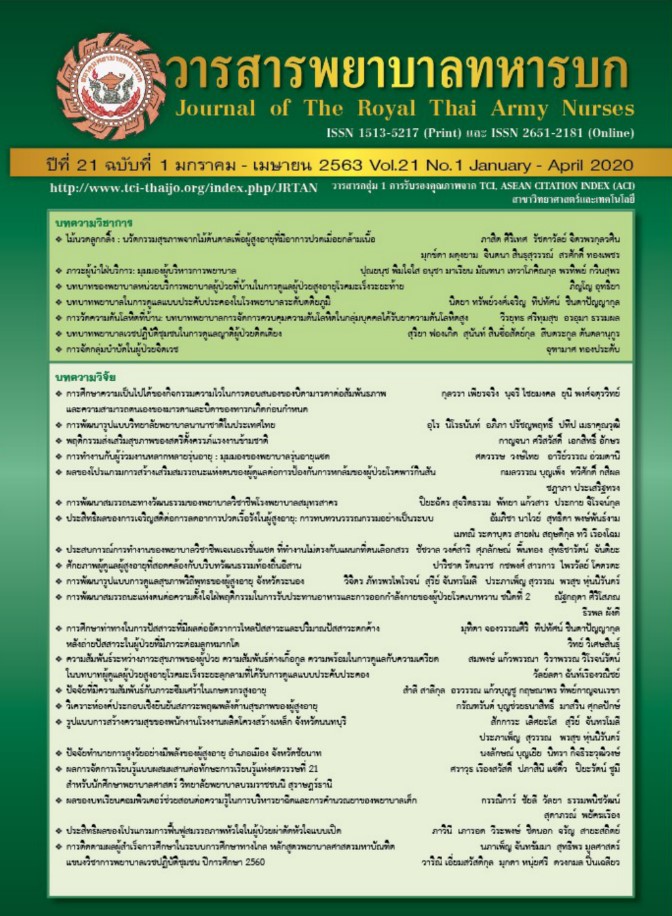The research and development of Family counseling model to enhance Family Transgenerational Communication
Keywords:
Family Transgenerational Communication, Family counseling model, Family Three-generationsAbstract
The purposes of research were to research and development of Family counseling model to enhance Family Transgenerational Communication. The research procedure consisted of 3 stages as follows :Stage 1 : Studying the Family Transgenerational Communication. Stage 2 : Development Family counseling model to enhance Family Transgenerational Communication and Studying the results of Family counseling model. Stage 3 : Assessing the effectiveness of the Family counseling model. The sample is Family three-generations living in Bangkok.
The results of this research revealed that:
1. The Family Transgenerational Communication consist of 6 factors they were Listener’s skill, Speaker’s skill, Self disclosure, Clarity, Continuity and Tracking, and Respect and Regard.
2. The Family counseling model based on Transgenerational Family Counseling and Integrated 4 counseling technique is I massage,Communication Stance,Enactment and Use of Directive. The intervention program of the Family counseling model included 8 sessions. Each session lasted about 60 minutes. The levels of Family Transgenerational Communication in the study and the control groups were significant interaction at .05 level when measured in the post - test phases. The levels of Family Transgenerational Communication in the study group in the post - test phases were statistically significant at .05 level from these in the pre - test phase.
3. Family counseling model can be use for enhance Family Transgenerational Communication.
Downloads
References
Daechacoop J. Danger :Thai family survival in the changing tide. Doccument for family academic conference 2015. Thai family study organization.2015; 24(1): 5-8. (in thai)
Miller M. Interpersonal Communication. Oxford Research encyclopedias of Communication. 2017; 23(4): 1-17.
Peek C. Features of Thai Families in the Era of Low Fertility and Longevity. State of Thailand’s Popular Report 2015.United Nations Population Fund Thailand.1st ed. Thailand: The United Nations Population Fund Thailand and the Office of the National Economic and Social Development Board; 2016.
Sillars A. Conversation and Conformity Orientations as Predictors of Observed Conflict Tactics in Parent-Adolescent Discussions.Journal of Family Communication.2014; 14(1): 16-31.
Paul F. C. Psychological research as the Phenomenologist views it. In Existential – Phenomenological Alternatives for Psychology (Valle R. & King M. eds). London: Oxford University Press ;1978: 48-71.
Gerald C. Theory and practice of counseling and psychotherapy. 10th ed. CA: Thomson Brooks-Cole/ Wadsworth; 2019.
Central T. The relationship between family communication patterns and internet addiction. International Journal of Psychology and Behavioral Research.2012; 5(3): 27-31.
Kulnapadol P. Transgenerational family counseling : From theoretical perspective to pratice. Journal of education Burapha university.2014; 23(3): 23-27. (in thai)
Kulnapadol P. Family Counseling. 2 nd ed. Bangkok: Ham compute offset; 2017: 132-151. (in thai)
Gerald C. Theory and practice of counseling and psychotherapy. 10th ed. CA: Thomson Brooks-Cole/ Wadsworth; 2019.
Chaleoykitti S. Submission Preparation Checklist. Journal of Thai Army Nurses. 2015; 16(3); 138-139. (in thai)
Downloads
Published
How to Cite
Issue
Section
License
บทความหรือข้อคิดเห็นใดใดที่ปรากฏในวารสารพยาบาลทหารบกเป็นวรรณกรรมของผู้เขียน ซึ่งบรรณาธิการหรือสมาคมพยาบาลทหารบก ไม่จำเป็นต้องเห็นด้วย
บทความที่ได้รับการตีพิมพ์เป็นลิขสิทธิ์ของวารสารพยาบาลทหารบก
The ideas and opinions expressed in the Journal of The Royal Thai Army Nurses are those of the authors and not necessarily those
of the editor or Royal Thai Army Nurses Association.






